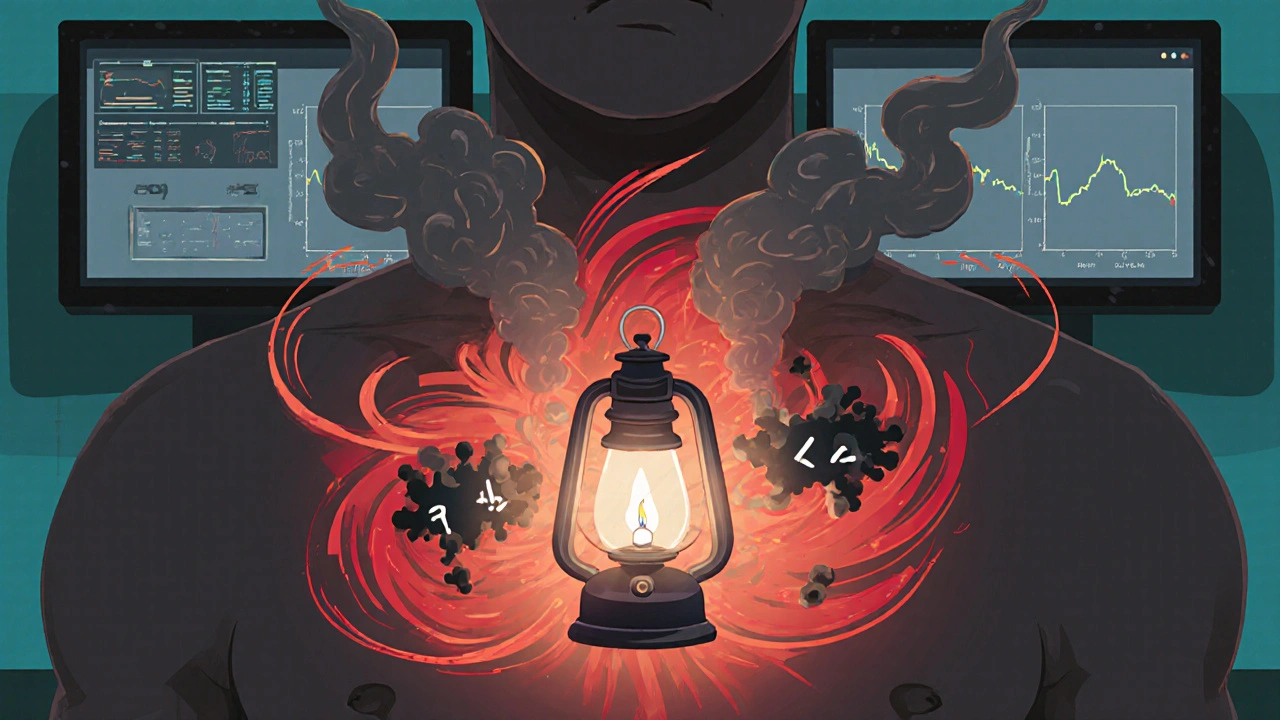
Why Your Thyroid Tests Look Wrong When You’re Sick
If you’ve ever had a serious illness-like pneumonia, sepsis, or a major surgery-and your thyroid blood tests came back abnormal, you might have been told you have hypothyroidism. But here’s the catch: your thyroid gland is probably fine. What you’re seeing is sick euthyroid syndrome, a common, natural response your body makes when it’s under severe stress. It’s not a disease. It’s a survival trick.
This isn’t rare. In intensive care units, 70 to 75% of critically ill patients show these strange thyroid lab patterns. Yet, most doctors aren’t trained to recognize it. And that’s dangerous. Mistaking this for true hypothyroidism leads to unnecessary hormone treatment-treatment that can actually hurt you.
What the Lab Results Actually Show
The hallmark of sick euthyroid syndrome is a drop in T3, the active thyroid hormone. In 95% of cases, T3 levels fall significantly. That’s the most consistent sign. In more severe or prolonged illness, T4-the main hormone your thyroid makes-also drops. At the same time, reverse T3 (rT3) rises. This is the inactive form of T3 your body makes when it’s trying to slow things down.
Here’s what you won’t usually see: a low TSH. In healthy people, low T3 and T4 trigger the pituitary to pump out more TSH to tell the thyroid to work harder. But in sick euthyroid syndrome, TSH stays normal-or sometimes even dips slightly. That’s the key clue. If your T3 and T4 are low but your TSH is normal, it’s almost certainly not primary hypothyroidism.
Some people see a slightly high TSH during recovery, between 4.1 and 10.0 mIU/L. That’s not a sign of thyroid failure-it’s your body coming back online. It’s the opposite of what you’d expect in true thyroid disease.
Why Your Body Does This
Your body isn’t broken. It’s adapting. When you’re fighting infection, trauma, or major illness, your metabolism needs to slow down to conserve energy. Your body redirects resources to vital organs-heart, brain, lungs-and away from less urgent functions like digestion, hair growth, and temperature regulation.
At the molecular level, inflammation shuts down the enzymes that convert T4 into T3. These are called deiodinases. Type 1 deiodinase activity drops by 30-50% in sepsis. At the same time, your body clears less reverse T3, so it builds up. Think of it like turning off the gas pedal and hitting the brakes at the same time.
Pro-inflammatory cytokines-chemicals like TNF-alpha, IL-1, and IL-6-spike during illness. These directly suppress the hypothalamus and pituitary, reducing the signal to the thyroid. Studies show TNF-alpha increases 8 to 12 times in severe sepsis. That’s not a lab error. That’s your body’s emergency protocol.
When Does This Happen?
Sick euthyroid syndrome doesn’t care about age or gender. It shows up in anyone with serious illness. The most common triggers:
- Sepsis: 80-85% of patients show changes
- Major surgery: 65-70%
- Severe burns: 75-80%
- Heart attack: 50-55%
- Diabetic ketoacidosis: 60-65%
Chronic conditions can trigger it too:
- Anorexia nervosa: up to 90% of severe cases
- Cirrhosis: 70-75%
- Chronic kidney disease: 60-65%
The changes happen fast. In trauma patients, abnormal labs appear within 24 to 48 hours of injury. This isn’t a slow, creeping problem. It’s an immediate physiological shift.
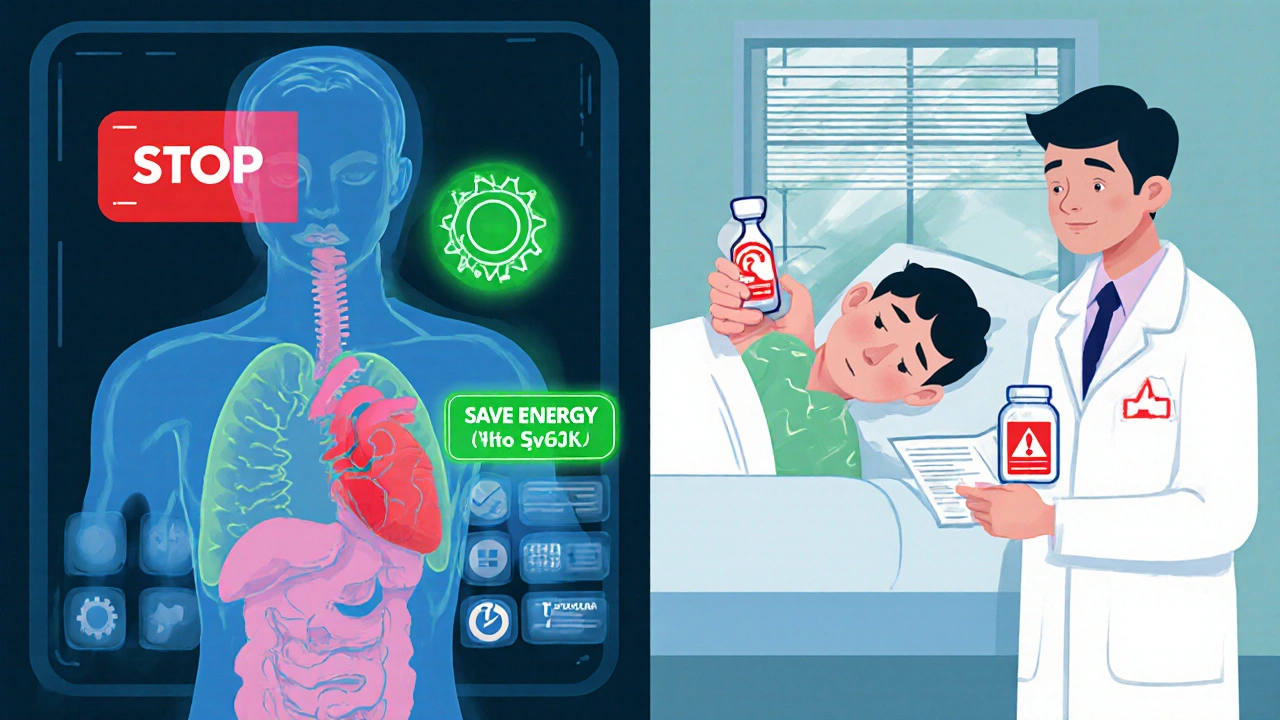
What It Feels Like (And What It Doesn’t)
The symptoms of sick euthyroid syndrome mimic hypothyroidism: fatigue (85% of cases), weakness (78%), feeling cold (65%), constipation (55%). In severe cases, you might have low body temperature, slow breathing, low blood pressure, or even confusion.
But here’s the difference: you won’t have the classic signs of true hypothyroidism. No puffy face. No dry skin. No hoarse voice. No myxedema. No thyroid antibodies. No goiter. Those are clues that point to an actual thyroid problem-not just illness.
That’s why you can’t rely on symptoms alone. A tired, cold, constipated ICU patient doesn’t automatically need thyroid hormone. That’s the trap many clinicians fall into.
Why Treating It Makes Things Worse
Here’s the hard truth: giving thyroid hormone to someone with sick euthyroid syndrome doesn’t help. It might hurt.
A 2022 clinical trial in the New England Journal of Medicine gave levothyroxine to 450 critically ill patients with low T3 and T4. Half got the hormone. Half didn’t. The results? Identical death rates. Identical ICU stays. No benefit. Zero.
Other studies show something scarier: inappropriate treatment increases mortality by 8-10%. Why? Because adding active thyroid hormone forces your body to burn energy when it should be conserving it. It increases heart rate and oxygen demand-exactly what your body is trying to avoid during critical illness.
Dr. Anne R. Cappola, a leading endocrinologist at the University of Pennsylvania, found that 12% of ICU patients are wrongly given thyroid hormones because their labs look like hypothyroidism. That’s not a small number. That’s hundreds of patients every year being treated for something that isn’t broken.
How Doctors Should Diagnose It
There’s no single test for sick euthyroid syndrome. Diagnosis is all about context.
Ask these questions:
- Is the patient acutely ill? (Sepsis? Major trauma? Recent surgery?)
- Are T3 and T4 low, but TSH normal or only mildly abnormal?
- Is reverse T3 elevated?
- Are there no signs of autoimmune thyroid disease (no antibodies, no goiter)?
If the answer is yes to most of these, it’s sick euthyroid syndrome. Don’t treat the labs. Treat the illness.
And if TSH is truly low-below 0.1 mIU/L-with low T3 and T4? That’s different. That’s central hypothyroidism. That’s rare. That needs treatment. But it’s not sick euthyroid syndrome.
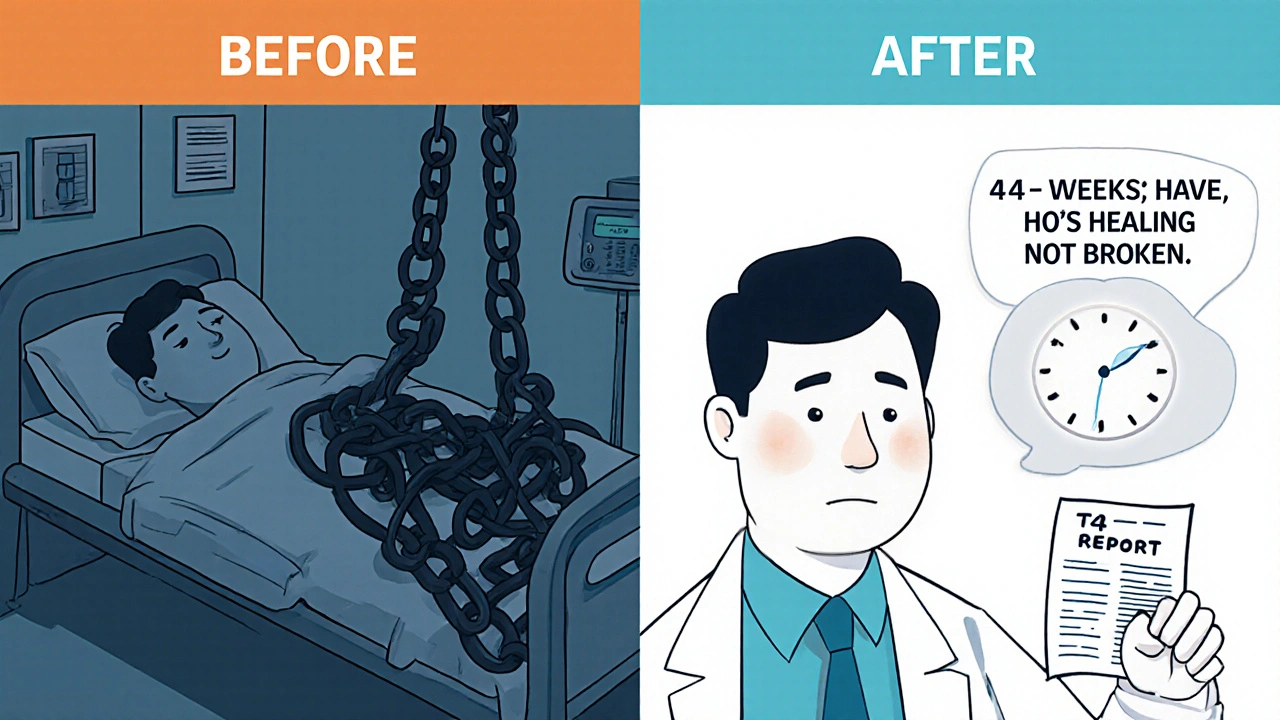
What Happens After You Recover?
Good news: once the illness resolves, thyroid function usually returns to normal within 4 to 6 weeks. That’s why repeat testing is so important.
If your T3 and T4 stay low after you’ve recovered, then you need to investigate further. Maybe you have true thyroid disease. Maybe you need treatment. But you can’t know that until the acute stress is gone.
Don’t get stuck on a single set of abnormal labs from when you were in the hospital. Wait. Let your body reset. Then test again.
What’s New in Research
Scientists are now using these abnormal thyroid patterns as a warning sign. A 2022 study in Critical Care found that patients with T3 levels below 40 ng/dL had a 45% chance of dying. Those with T3 above 80 ng/dL had only a 15% risk. The lower the T3, the worse the outlook.
A major study called EUTHYROID-ICU is now tracking 2,500 critically ill patients across Europe and Australia. Researchers are trying to map specific patterns of hormone changes to predict who will recover quickly-and who might need more aggressive support.
The big takeaway? Sick euthyroid syndrome isn’t a problem to fix. It’s a signal to watch. The lower the T3, the sicker the patient. That’s useful information. But treating it with hormones? That’s outdated thinking.
Bottom Line: Don’t Treat the Labs. Treat the Patient.
Sick euthyroid syndrome is one of the most misunderstood conditions in endocrinology. It’s not a thyroid disease. It’s your body’s way of surviving a crisis. The labs look broken. But your thyroid? It’s working perfectly.
If you’re sick and your thyroid tests are strange, don’t panic. Don’t ask for thyroid pills. Ask your doctor: “Is this sick euthyroid syndrome?” and “What’s the main illness I’m fighting?”
The best treatment? Recovery. Time. Nutrition. Support. Not hormones.
And if you’re a doctor? Don’t order thyroid tests on every ICU patient. Don’t treat low T3. Don’t assume it’s hypothyroidism. You’re not helping. You might be killing.

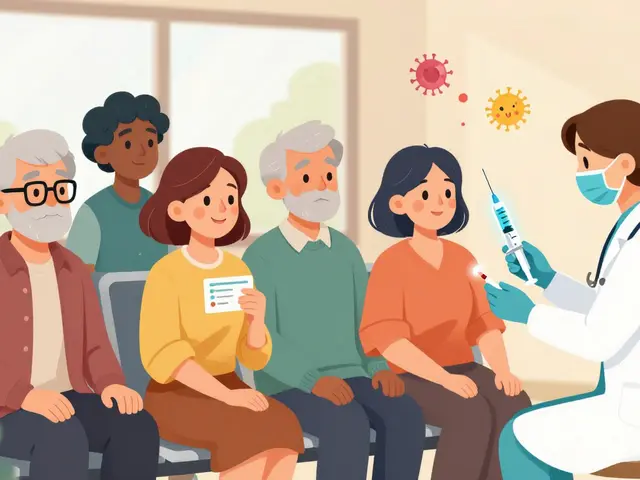
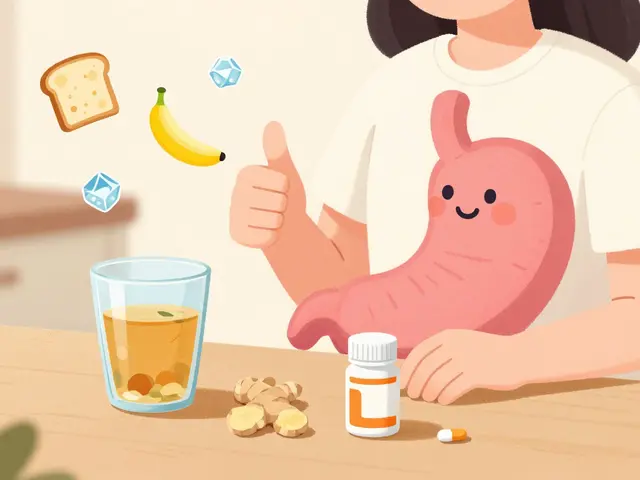


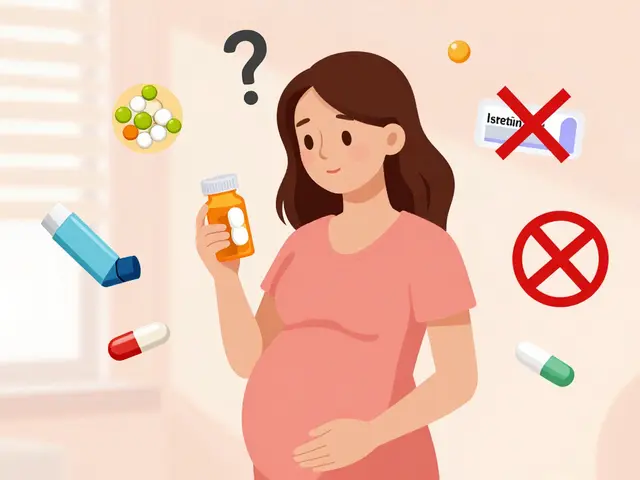
8 Comments
This is wild. I had a double bypass last year and my thyroid numbers were all over the place. Docs wanted to put me on levothyroxine. I said no. Turned out I was just recovering. Took 6 weeks. Now I'm fine. Don't treat the numbers, treat the person.
TL;DR: Your thyroid isn't broken. Your body's just conserving energy. Stop panicking.
Oh wow. Another ‘trust your body’ pseudo-scientific fairy tale. So we’re just supposed to ignore lab values now? That’s how people die. T3 is a biomarker. It’s not ‘signaling’-it’s physiological failure. If you’re in the ICU and your T3 is 28 ng/dL, you’re not ‘adapting’-you’re dying. And yes, giving T3 *can* help. The NEJM study had selection bias. They didn’t even measure tissue-level deiodinase activity. This is dangerous fluff wrapped in a lab coat.
The epistemological fallacy here is assuming that physiological adaptation equates to therapeutic irrelevance. The body’s stress response is not a moral imperative-it is a biological contingency. To conflate homeostatic modulation with diagnostic inertness is to confuse mechanism with mandate. The NEJM trial may show no mortality benefit, but it also fails to account for the heterogeneity of metabolic decompensation. Reverse T3 accumulation is not merely a biomarker; it is a metabolic signature of systemic collapse. To withhold intervention on the basis of ‘context’ is to romanticize entropy.
OMG I CAN’T BELIEVE THEY’RE STILL DOING THIS 😭 I had this happen after my C-section and they tried to give me thyroid meds!! I cried in the hospital because I felt so guilty for ‘not being strong enough’ to have a normal thyroid… like it was my fault!! 🥲 I’m so glad someone finally said it: YOUR BODY ISN’T BROKEN. IT’S SURVIVING. 💪❤️
And who funds these studies? Big Pharma? The thyroid med market is $12B. You think they want you to know your body fixes itself? No. They want you dependent. TSH? T3? T4? Reverse T3? All controlled by the same labs that sell the tests. The CDC doesn’t even list sick euthyroid syndrome as a ‘real’ diagnosis. Coincidence? I think not. 🤔💉 #ThyroidCoverUp
As a nurse in Mumbai ICU, I see this every day. Patients come in with sepsis, labs look like hypothyroidism, family panics, doctors reach for Synthroid. I stop them. I say: ‘First, fix the infection. Then, wait.’ Most recover fully in 3–4 weeks. No pills needed. This is not a Western problem-it’s a global one. We need better training, not more pills. 🙏❤️
I’m a thyroid patient. I have Hashimoto’s. I’ve been on levothyroxine for 8 years. I’ve seen the *exact* same lab patterns during flu season, after surgery, during stress. And guess what? When I was sick, my doctor didn’t give me more meds. He said, ‘This isn’t your thyroid failing. This is your body being overwhelmed.’ That’s the difference between a good doctor and a lab-chaser. You don’t treat the numbers-you treat the person. And if you’re not doing that? You’re not a doctor. You’re a technician.
This is exactly why I tell my patients: ‘Don’t chase numbers. Chase recovery.’ I’ve seen people get discharged from ICU, get their labs redone 3 weeks later, and say, ‘Wait… I’m not hypothyroid?’ Yes. You were just sick. And that’s okay. Your body knew what to do. You just needed time. And maybe a good meal. And sleep. Not a pill. 🌱